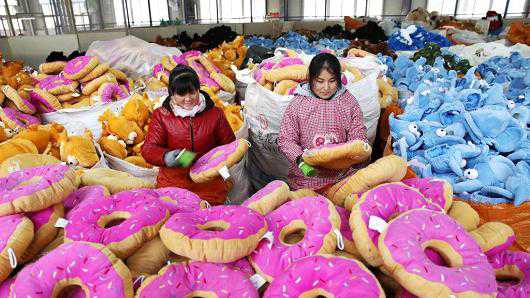China's economy grew 6.9% in 2017, topping both the official target and 2016's growth
19 January, 2018

China's economy grew 6.9 percent in 2017, ending the year on a positive note as official figures topped the government target of around 6.5 percent, the country's statistics bureau said on Thursday.
The growth came despite widespread concerns in the last year about financial risks in the East Asian giant amid a government-led economic restructuring.
"It is true that there is a part of the economy — the old economy, heavy industries, property-linked (sectors) — which is slowing deliberately. But there are other parts, the new economy which includes services...(and) includes parts of the manufacturing sector, high tech (industries) which are showing strength and that seems to be persisting in this data," said Duncan Wrigley, chief strategist at Everbright Sun Hung Kai.
The 2017 data represented an improvement over the prior year: China's final GDP figure for 2016 was 6.7 percent, which was the lowest in 26 years.
For 2017's fourth quarter, GDP growth was 6.8 percent. That topped analysts' forecast for 6.7 percent growth in the quarter from the same period a year ago, according to a poll of economists by Reuters.
Beijing's official full-year GDP target for 2017 had been "around 6.5 percent," but there was already an upside surprise expected as the country repeatedly posted robust economic data in part due to a global recovery.
Looking ahead, economists polled by Reuters predicted China's economic growth would slow to 6.5 percent in 2018.
The Chinese economy is going through a phase of "creative destruction" as lively new economy sectors like e-commerce and online financial services coexist with still-dominant old economy sectors, said Chi Lo, BNP Paribas Investment Partners economist for Greater China.
However, growth in the old economy still outpaces in the new economy, so "when you mix the two together, there is an inherent drag on growth," Chi told CNBC.
"The power of creation is not yet strong enough to overwhelm the power of destruction in the economy, but the transition is structurally positive," he added.
China, for its part, will keep its target for economic growth at "around 6.5 percent" in 2018, unchanged from last year, Reuters reported earlier in January, citing unnamed policy sources.
The world's second-largest economy has been fighting debt for years as it tries to balance economic stability against the potential fallout from any sharp deceleration.
Resilient external demand and robust domestic household consumption will bolster China's economy in 2018, said Sian Fenner, economist at Oxford Economics.
"The government is making moves to make sure that, for one thing, (the country is) rebalancing away from investment (with) monetary tightening and policies for ensuring that financial risks are also reduced, which should also mean that investment actually does continue to slow this year," Fenner told CNBC.
She said she expected Chinese real estate investment to slow this year, although low inventories will prevent the sector from a sharp slowdown.
Risks to the Chinese economy in 2018 include trade protectionism as U.S. President Donald Trump's administration looks like to readdress the yawning trade gap between the two countries, Fenner added.
